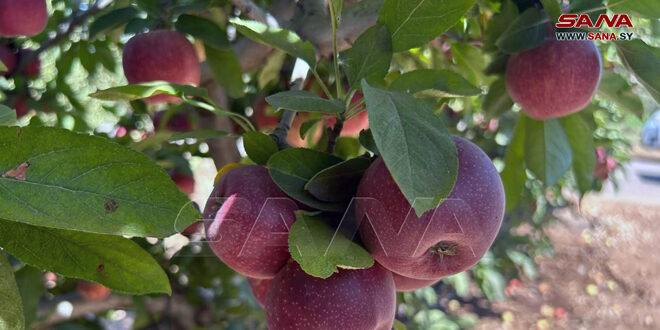Farmers in occupied Syrian Golan start harvesting their apple crop despited marketing difficulties imposed by Israeli occupation
From Baqaatha village to the foothills of Mount Hermon, the apple harvest season has begun in the occupied Syrian Golan, despite the difficulties which Syrian people in occupied Golan are facing as a result of the aggressive schemes of the Israeli occupation that aimed at displacing them from their land, the most dangerous of which is the plan to install wind turbines on wide areas of Golan agricultural land, a scheme that was thwarted by the Golanese thanks to their steadfastness and defense of its lands.
In addition to its distinctive taste and high quality, Golan apples are a symbol of Golan citizens’ belonging to the land and the thay have the flavor of the struggle of the farmers who constantly face the occupation’s attempts to seize their land, steal their water, prevent the marketing of the crop to the homeland, Syria, and restrict marketing operations to occupied Palestine.
Since the early morning hours, convoys of farmers in the occupied Syrian Golan have headed to their orchards, which extend over vast areas between the villages of Baqatha, Majdal Shams and Masada, with the start of the apple harvest season this year, despite the Israeli occupation’s restrictions on them as part of its continuous aggressive practices.
Some of the farmers told SANA reporter in occupied Golan that the season was good in terms of quantity and quality, unlike previous years, in addition to the fact that prices are still acceptable, noting that they have provided much care to the apple season to compensate for their losses in the cherry season.
Youssef Shams, head of the Golan apple import committee to Syria, said: “as for the quantities of apples, they are good this season, despite the variation between one region and another, but overall they are promising”.
He indicated that the areas planted with apples in the Golan are estimated at 15 thousand dunams, 4 thousand of which face the risk of the occupation seizing them under the pretext of implementing the turbines plan.
Shams pointed out that for a decade now, the occupation has been closing the Quneitra crossing to prevent farmers from marketing their crops in their homeland, which added a huge burden on them over the past 10 years.
He expressed hope that the Quneitra crossing would be reopened again to market crops in Syria, adding that the Syrian state has been responsible for importing most of the quantities, at prices that compensated the people of the Golan for their losses.
For his part, Fares Awidat said: The Golan produces the best types of apples in the region due to its height above sea level, the availability of a suitable environment for its cultivation and of necessary amounts of water, in addition to the great care and efforts that the people of the Golan give to their fertile lands and crops.
Awidat stressed that the apples of the occupied Syrian Golan is a story of steadfastness and rootedness for the residents of the occupied Golan people, who will not allow the occupation to implement its settlement plans in it, pointing out that preserving it is a moral and national duty, and that the people of the Golan have been an example in preserving their land and identity since the occupation of the Golan in 1967.
Since August the 27th , 2014, the Israeli occupation has closed the Quneitra crossing, which is the only crossing for the people of the Golan to communicate with their homeland, Syria, and prevented the import of cherry and apple crops to the markets of the homeland, despite Syria’s continuous demands for the international community to put pressure on Israel, the occupying power, to open the crossing, which represents the artery that connects the people in the occupied Golan to their homeland.
Rawaa Ghanam

